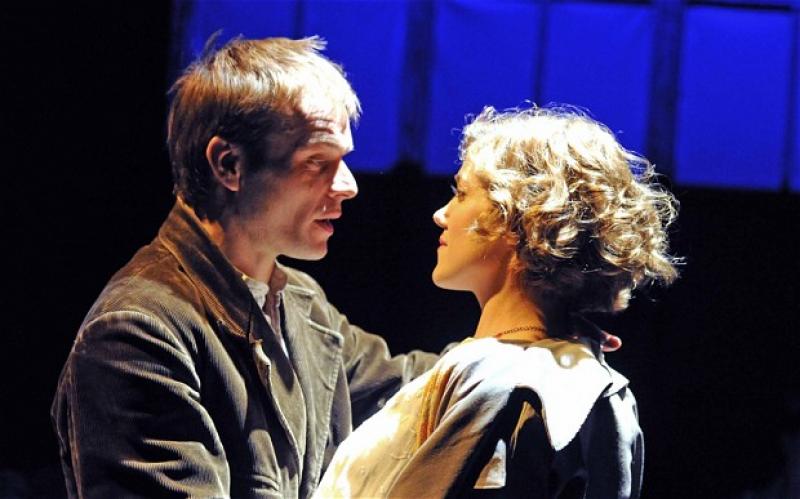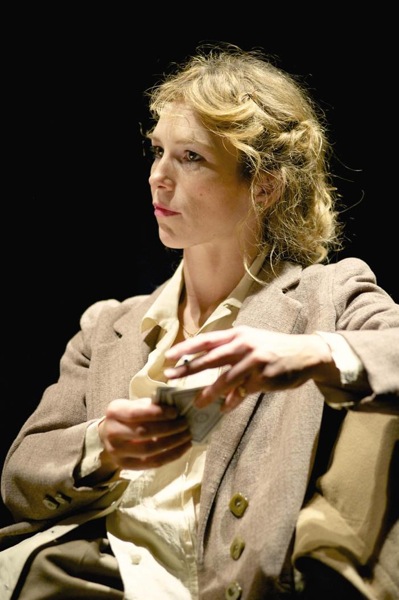These Shining Lives, Park Theatre | reviews, news & interviews
These Shining Lives, Park Theatre
These Shining Lives, Park Theatre
London's new theatre makes a thrilling debut, albeit with a play a little less shiny

North London has a splendid new theatre, The Park, whose £2.5 million existence – without a penny of government subsidy – is something of a miracle given our cash-strapped times. The building itself is also a bit of a marvel, tucked into a Tardis-like space (originally a blacksmith’s) in the heart of Finsbury Park. With two stages – a 200-seat main theatre and a 90-seat studio – and a strong community ethos, The Park has heaps of promise.
The opening play, however, doesn’t quite offer the dramatic fireworks one might have expected, or hoped, for the occasion. The fault isn’t so much in the production as in the play itself. American playwright Melanie Marnich’s account of a tragic, significant moment in her country’s labour history is engaging, but also hampered by a sort of mannered modesty of ambition.
It’s 1922, in Chicago. The times are anything but roaring for the working class. When wife and mother of two Catherine Donohue (Charity Wakefield) gets a job in a local factory, her welder husband Tom (Alec Newman) may not like it, but they both know it makes financial sense. For Catherine, the opportunity to experience employment, to earn in her own right, is thrillingly liberating.
 Unfortunately, the job is at the Radium Dial Company, painting the dials on watches that will give them their glow. The unfortunate phrase Catherine and her co-workers use to describe their routine, licking their brushes each time they apply a numeral, is lip, dip, paint.
Unfortunately, the job is at the Radium Dial Company, painting the dials on watches that will give them their glow. The unfortunate phrase Catherine and her co-workers use to describe their routine, licking their brushes each time they apply a numeral, is lip, dip, paint.
Marnich paints an affectionate picture of the friendship that develops between Catherine and her friends – bolshy Charlotte (Honeysuckle Weeks, pictured right), group gossip Frances (Melanie Bond) and dippy Pearl (Nathalie Carrington) – as they feel the empowerment and pleasure of their own few dollars and each other’s company. Of course what their bosses know, but they do not, is that their work on these timepieces is effectively winding down time for them.
Despite our own awareness of their predicament, the play does exercise some grip – and outrage – as these poor women start to glow in the dark, their bodies decaying from within. But as it progresses, the dramatic limitations become apparent. Rather than Catherine’s artificial narration, we need to feel the world around her, of Prohibition, the Depression when it arrives, the working community of which Tom is the only other representative. In its absence, the drama of Catherine’s fight for justice becomes laboured – more History Channel than A View from the Bridge.
It’s nicely acted. Wakefield and Newman convey the impact upon their sweetly loving couple very well, while Weeks, well known for her role in TV's Foyle's War, reveals a soft centre to her cool-eyed, acerbic Charlotte. More significantly, given the occasion, director Loveday Ingram, designer Tim Shortall and lighting designer Rob Casey show off the intimate, thrust stage to good effect – the staging minimal, the actors bustling past us, with telling images (a shower of clock faces, factory walls, a glorious night sky) cast upon the panelling at the back. I particularly appreciated the daring, in the terrible moment that the women learn the extent of their fate, of having the actresses seated with their backs to the audience. There’s nothing like being up close, yet still denied.
rating
Explore topics
Share this article
The future of Arts Journalism
You can stop theartsdesk.com closing!
We urgently need financing to survive. Our fundraising drive has thus far raised £49,000 but we need to reach £100,000 or we will be forced to close. Please contribute here: https://gofund.me/c3f6033d
And if you can forward this information to anyone who might assist, we’d be grateful.

Subscribe to theartsdesk.com
Thank you for continuing to read our work on theartsdesk.com. For unlimited access to every article in its entirety, including our archive of more than 15,000 pieces, we're asking for £5 per month or £40 per year. We feel it's a very good deal, and hope you do too.
To take a subscription now simply click here.
And if you're looking for that extra gift for a friend or family member, why not treat them to a theartsdesk.com gift subscription?
more Theatre
 Intimate Apparel, Donmar Warehouse review - stirring story of Black survival in 1905 New York
An early Lynn Nottage work gets a superb cast and production
Intimate Apparel, Donmar Warehouse review - stirring story of Black survival in 1905 New York
An early Lynn Nottage work gets a superb cast and production
 Hercules, Theatre Royal Drury Lane review - new Disney stage musical is no 'Lion King'
Big West End crowdpleaser lacks punch and poignancy with join-the-dots plotting and cookie-cutter characters
Hercules, Theatre Royal Drury Lane review - new Disney stage musical is no 'Lion King'
Big West End crowdpleaser lacks punch and poignancy with join-the-dots plotting and cookie-cutter characters
 Showmanism, Hampstead Theatre review - lip-synced investigation of words, theatricality and performance
Technically accomplished production with Dickie Beau never settles into a coherent whole
Showmanism, Hampstead Theatre review - lip-synced investigation of words, theatricality and performance
Technically accomplished production with Dickie Beau never settles into a coherent whole
 4.48 Psychosis, Royal Court review - powerful but déjà vu
Sarah Kane’s groundbreaking play gets a nostalgic anniversary reboot
4.48 Psychosis, Royal Court review - powerful but déjà vu
Sarah Kane’s groundbreaking play gets a nostalgic anniversary reboot
 Joyceana around Bloomsday, Dublin review - flawless adaptations of great dramatic writing
Chapters and scenes from 'Ulysses', 'Dubliners' and a children’s story vividly done
Joyceana around Bloomsday, Dublin review - flawless adaptations of great dramatic writing
Chapters and scenes from 'Ulysses', 'Dubliners' and a children’s story vividly done
 Stereophonic, Duke of York's Theatre review - rich slice of creative life delivered by a 1970s rock band
David Adjmi's clever and compelling hit play gets a crack London cast
Stereophonic, Duke of York's Theatre review - rich slice of creative life delivered by a 1970s rock band
David Adjmi's clever and compelling hit play gets a crack London cast
 North by Northwest, Alexandra Palace review - Hitchcock adaptation fails to fly
Emma Rice's storytelling at fault in misconceived production
North by Northwest, Alexandra Palace review - Hitchcock adaptation fails to fly
Emma Rice's storytelling at fault in misconceived production
 Hamlet Hail to the Thief, RSC, Stratford review - Radiohead mark the Bard's card
An innovative take on a familiar play succeeds far more often than it fails
Hamlet Hail to the Thief, RSC, Stratford review - Radiohead mark the Bard's card
An innovative take on a familiar play succeeds far more often than it fails
 The King of Pangea, King's Head Theatre review - grief and hope, but no connection
Heart and soul proves insufficient in world premiere of therapeutic show
The King of Pangea, King's Head Theatre review - grief and hope, but no connection
Heart and soul proves insufficient in world premiere of therapeutic show
 A Midsummer Night's Dream, Bridge Theatre review - Nick Hytner's hit gender-bender returns refreshed
This Dream is a great night out, especially for Shakespeare first-timers
A Midsummer Night's Dream, Bridge Theatre review - Nick Hytner's hit gender-bender returns refreshed
This Dream is a great night out, especially for Shakespeare first-timers
 Miss Myrtle’s Garden, Bush Theatre review - flowering talent, but needs weeding
New play about loss, love, grief and gardening is humane, but flawed
Miss Myrtle’s Garden, Bush Theatre review - flowering talent, but needs weeding
New play about loss, love, grief and gardening is humane, but flawed
 Fiddler on the Roof, Barbican review - lean, muscular delivery ensures that every emotion rings true
This transfer from Regent's Park Open Air Theatre sustains its magic
Fiddler on the Roof, Barbican review - lean, muscular delivery ensures that every emotion rings true
This transfer from Regent's Park Open Air Theatre sustains its magic

Add comment